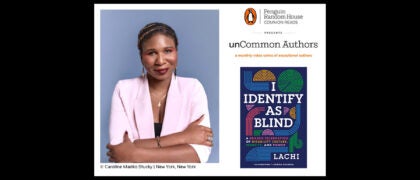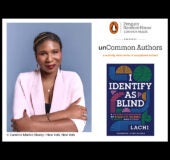Research shows the benefits incoming students glean from participating in a common academic experience as they join a new campus community (Hunter, 2006; Mintz, 2019). These findings have led many institutions to develop Common Reading programs for new members of their campus communities. These programs, centered around a group of faculty, staff, and students selecting a particular text and participating in reading and discussion together, take place at over 200 institutions across the world at the start of each academic year.
In making a summer reading selection, some institutions choose to lean into difficult topics to highlight the types of discussions incoming students may have with their peers in their new academic and social environment. Here at Duke, we seek out books that have complex themes we hope to discuss with our students to role model the type of environment they will encounter while on campus. In the spring of 2020, our committee (with particularly adamant support from the students on the committee) selected Know My Name by Chanel Miller as the Duke Common Experience book for the year. While we were excited about the selection, we were particularly cognizant of sharing this news in a thoughtful manner, knowing that, by the statistics, many members of the Duke community—current students, incoming students, and/or their families—would have survived themselves or know someone who survived an experience like Miller details in her text.
With this in mind, our team would like to share 5 items we thought were most important in selecting texts with polarizing, controversial, or difficult topics for your common reading program.
#1- Stick to the program’s intended learning outcomes.
Selecting a controversial book will feel more controversial if you deviate from the intended goals of your summer reading program. Each year before we begin our process, we spend time reviewing previous selections and discussing the goals, intended outcomes, and expectations for our summer reading selection. Ensuring each member of the committee is reminded of our intentions aids in the process of selecting a text and ensures we are focused on the shared values of the group.
#2- Don’t make your selection in a vacuum.
At Duke, like at many other universities, we take nominations for the summer reading selection. As the list of nominees is whittled down to a smaller and smaller list, once we reach our top 3-7 books, we again solicit the broader Duke community for their feedback on which book would be the best selection for incoming students. This process allows the community to be updated on our progress and to provide input on our selection. It is worth noting when we share our top choices with the broader community, we are clear that they are not voting on a selection; instead, they are sharing why a particular nomination would be a good selection for incoming students. Our committee then takes this feedback and relies on it heavily (along with student community member input) in making the final selection.
This year, after Miller’s Know My Name was selected, our committee worked with the Office of Parent and Family Programs, the Vice Provost for Student Affairs, Vice Provost of Undergraduate Education, and the Duke University Women’s Center to share context about the selection with incoming students and their families. The Women’s Center staff wrote a letter to all incoming students highlighting that this text may be triggering and shared campus resources should a student need support. The VP for Student Affairs worked with Duke’s Office of Institutional Equity and the Office of Parent and Family Programs to pen a letter to families discussing the purpose of this program and various resources for support. Working with these campus partners ensured: 1) they knew the selection was made, and 2) they were prepared to address any potential concerns or questions without feeling blindsided.
#3- Leverage university experts to lead discussions.
When selecting Know My Name, our committee spent quite a bit of time discussing how we could prepare our community for this text. For us, that meant leaning heavily on the experts who support victims of sexual violence. Due to a strong relationship with our university’s Women’s Center, we were able to lean on their expertise while communicating with new students. For the first time, we provided virtual space for the incoming class to read the book over the summer with the Women’s Center team. Each week, we offered summer reading discussions with incoming students, the Women’s Center team, and campus student organization S.H.A.P.E. (Sexual Health and Assault Prevention and Education). Each week for seven weeks, these discussions focused on a chapter in the book and brought together incoming students with their Duke peers to discuss topics highlighted in the book including gender violence, justice, intersecting identities, privilege, and family as students read.
#4- Provide space for the campus community to discuss.
In selecting Know My Name, we thought it was important for current students, incoming students, and the university to have the opportunity to discuss the selection. We advertised several university-wide, staff-only discussions about the book in an effort to spread the word about the choice, while also providing space for staff to share their insights about the book. This opportunity proved both cathartic and a space to build community among staff members.
#5- Effectively prepare students’ space to discuss.
Finally, we knew we would need to prepare our students to discuss this book with their incoming peers. We worked with several campus partners to prepare our student leaders (generally rising sophomores) for discussing this book with their peers. We worked with Duke’s Program in Education to highlight the best ways to facilitate a conversation. We worked with the Women’s Center team to lead several trainings on supporting students who may experience trauma and how our student leaders could support them if this emerged during their discussions. Finally, we worked with Duke’s health and wellness teams to frame conversations with incoming students about this topic in a format that allowed for peer leaders to empathize, validate, and feel each other’s stories, which would hopefully lead to positive, sustainable change.
The truth is, even taking all these steps and having the opportunity to welcome author Chanel Miller virtually in August to speak with our campus community, there were bumps along the road. We want to be clear—we could not have estimated the overwhelmingly positive impact this kind of selection would have with our campus community. However, despite this positive feedback, this selection highlighted that, despite our best efforts, a significant number of our students, especially female-identified students, have survived or know someone who has survived an experience of sexual violence. The realization that we still have a lot of work to do was an important reminder in our quest to create a more just society, both at Duke and beyond. And, here at Duke, we believe summer reading programs are just one of many ways we can continue to make ensure equity, justice, and liberation are at the center of our work.






